Submitted by nsscadmin on
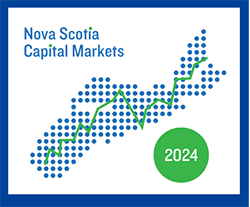
On October 3, the Nova Scotia Securities Commission (NSSC) hosted Nova Scotia Capital Markets 2024 (NSCM2024). NSCM2024 was a public forum with insightful presentation and panels on the latest trends, challenges, and developments within Nova Scotia Capital Markets.
In case you were unable to attend here’s quick review of the panels and what was discussed at NSCM2024. For a rundown of the day’s schedule and panelist bios you can visit the NSCM2024 website.
There were four panels presented at NSCM2024. The first panel was “Raising Capital in Nova Scotia. It featured:
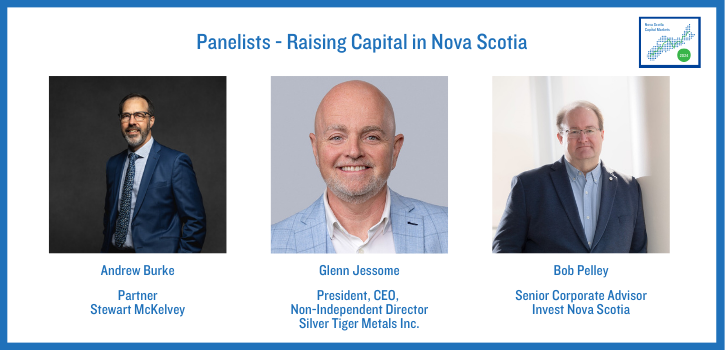
After a short introduction by panel moderator, NSSC Chair and CEO Paul Radford, Andrew Burke began the panel with a short description of public and private offerings in Nova Scotia and the pros and cons of each.
Glenn Jessome was enthusiastic about possibilities for raising capital in Nova Scotia, but advised that it took a lot of work. “It can be done here, but it’s not easy”, Jessome said after highlighting a group that in Nova Scotia that had raised $2 billion.
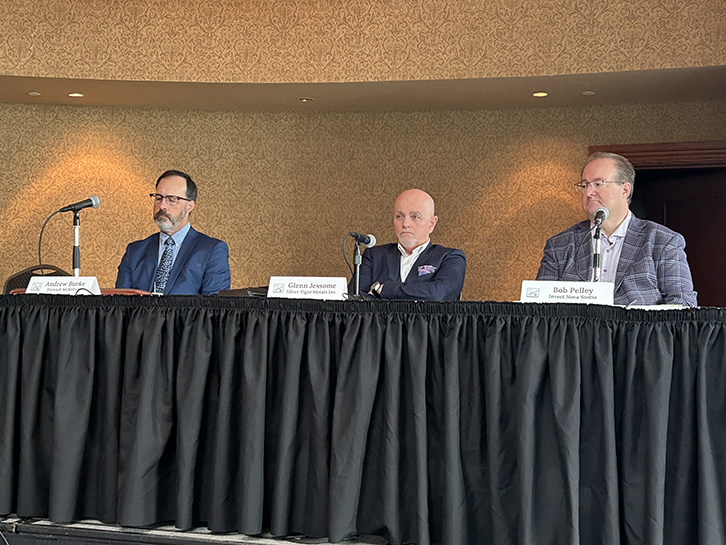
Bob Pelley described capital raising programs that are available through Invest Nova Scotia, noting that Invest Nova Scotia and its predecessors had committed more than $140 million to Nova Scotia businesses since 1996.
Glenn also praised the NSSC as a resource for those looking to raise capital in the province. “The NSSC are unbelievable, they’re not the bad guy. They’re a tremendous resource that are there to help you.”
The second panel of NSCM2024 was Developments in Public Company Continuous Disclosure. It featured:
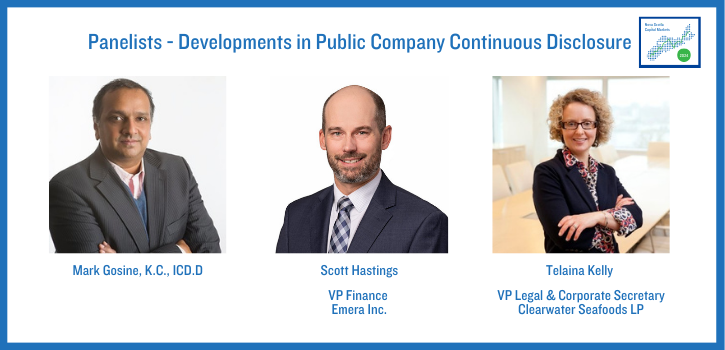
Panel moderator, NSSC Director of Corporate Finance Abel Lazarus, began the panel with an overview of continuous disclosure obligations in Nova Scotia and the decline in the number of public companies in Canada.
Scott Hastings got the discussion started by outlining some of the disclosure requirements that Emera faces and how they are not only important to investors but to the company as well as they face and meet challenges such as new climate change disclosures.
Mark Cosine commented on his past work with DHX Media and how challenging it can sometimes be for a small company to find someone on staff familiar with disclosure requirements. “The continuous wave of new disclosure obligations in a small company office with limited resources can make it difficult.”
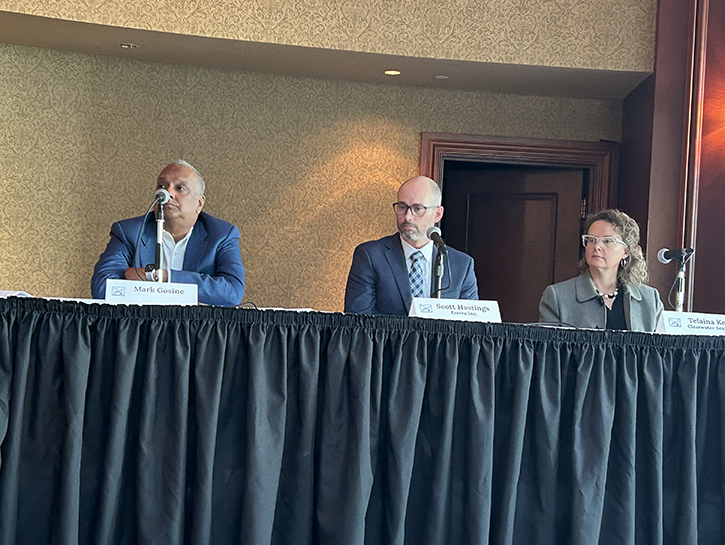
Telaina Kelly was part of Clearwater Seafoods transition from a public company to a private company. She said that despite the company no longer being required to provide certain disclosures, they continue to anyway as it’s better for the company. Telaina also added that if a company was planning to go public, it’s best to start acting like a public company right away as it will make the transition much easier.
The panel also discussed potential changes to diversity disclosures in the future, which all three agreed were a necessary next step for the disclosure process. Scott called it “the natural evolution of board discussion” that currently takes place, while Telaina added that it was “a conversation that started in our organization a long time go and remains an important conversation to have.” Mark added one important note to diversity disclosure, “the importance isn’t the reporting, it’s what you do with it.”
The third panel of the day was Combating Fraud. It featured:
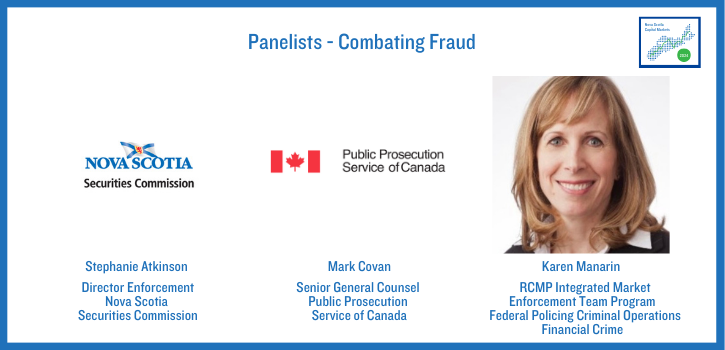
Panel moderator David Harrison began the panel with an overview of reported investment fraud numbers in Canada, which have been substantially on the rise in recent years. David also mentioned that there is a public perception that Canada is soft on white collar crime.
Stephanie Atkinson began by giving an overview of what the NSSC Enforcement branch has been seeing in recent years. Stephanie concurred with the numbers from the Canadian Anti-Fraud Centre that there has been a tremendous increase in reported fraud in Nova Scotia, most of which is connected to crypto assets in some way.
Karen Manarin shared her perspective from working with the RCMP on investigating and combating investment fraud. Karen spoke about some of the limitations and legal hurdles that RCMP investigators face, compared to securities regulators and their law enforcement colleagues in the United States, that can make investigations much more difficult and lengthier.
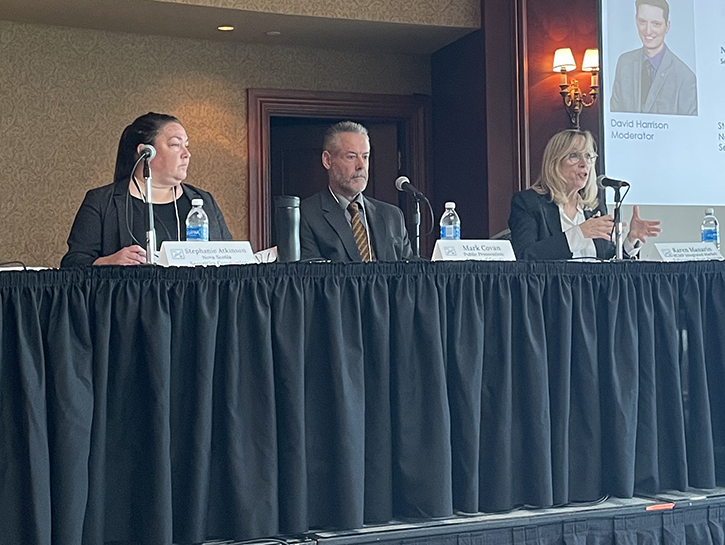
Mark Covan agreed with Karen’s assessment that Canadian laws and privacy regulations can often overburden prosecutors working on cases involving investment fraud and white collar crime. This includes a limited ability to summon testimony and evidence, and well as limitations when it comes to looking at evidence and statements collected by other organizations, such as securities regulators. Mark alluded to the fact that if you provide a “box of crime” that proves your guilt in a fraud offense, prosecutors may not be able to even look at it or use it during trial.
The panel compared the time it took to conclude the FTX matter in the U.S. and the Knowledge House (KHI) matter in Canada. In the U.S., FTX’s Sam Bankman-Fried was arrested in November, 2022, convicted in court in November 2023, and sentenced to 25 years in prison in March 2024. The KHI matter (for which Mark was a prosecutor) took more than a decade from start to finish in Nova Scotia and resulted in sentences of up to five years for the accused.
The final panel of NSCM2024 was Beyond Bitcoin: Investments in Beneficial Technology. It featured:

Panel moderator, NSSC General Counsel and Secretary Doug Harris introduced the topic and mentioned that in the previous panels, especially the fraud panel, crypto assets and innovative technology did not play a positive role. However, innovative technology itself is not bad itself, only how some unscrupulous people chose to use it.
Keegan Francis began by describing what he was seeing in Nova Scotia around local businesses using crypto and decentralized finance. His answer was “not much right now”, as crypto and other new financial technologies have had trouble finding a foothold in the province. He would like to see more intervention from leaders to support the use of new technologies.
Jason Alcorn spoke to the regulation of new technologies as a member of the CSA Investor Advisory Panel. He said he was impressed with what the CSA and Canadian regulators had done so far in regulating the space, as many other jurisdictions have “struggled with how to best regulate new innovations.” In Canada he believes we’ve seen a strong “made to measure regulatory response,” but there’s still improvements to make and more to do.

Alicia Roisman Ismach said the development of commercialized fintech businesses in Nova Scotia has been slow but there is a very strong basis of technology knowledge in the region, and we have the ability to “be the pioneers of the application of new technologies.”
Keegan noted some of the advantages the Atlantic region has in the innovative finance space, including access to energy-rich sources (such as tidal power production and residual heat recycling), and heightened immigration and exposure to globalization. Keegan did note that improved financial literacy both traditional and non-traditional is need throughout the region.
The NSSC again thanks all panel members and attendees of NSCM2024 for making the event a great success.
